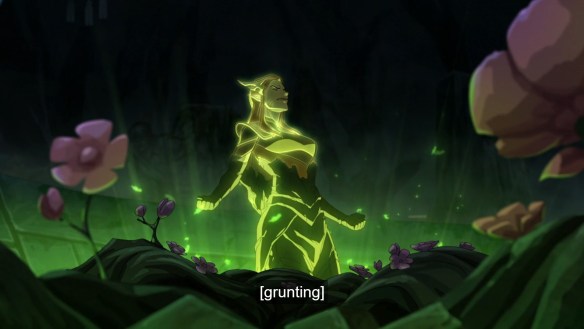Hello folks, and welcome back to Wrong Every Time. Today we’re returning to the tales of Vox Machina, who recently suffered a schism in the wake of their dubious victory over Thordak. Fed up with her teammates’ lack of trust in her decisions, Keyleth packed up her feathers and flew home, seeking her own methods of detecting Raishan’s location. The twins then set out to find Anna Ripley, and hopefully let Percy rest in peace. Meanwhile, Grog and Pike stayed back at the half-destroyed manor, praying for a method of raising Scanlan from his apparent coma.
It’s certainly a low point for Vox Machina, but it’s a well-placed and necessary one. The battle against Thordak focused the party’s priorities, and thereby let them forget for a time the natural divisions and divergent ambitions of their constituent members. The fact that they’re splitting now is a demonstration of how well they’ve been defined as individuals, serving as both a brief cooldown of dramatic tension and an affirmation of their personal progress. The primacy of the party is a core aspect of DnD, but if you want to build a fully furnished fantasy adventure, you must also allow the space for players to define themselves as members of a larger living world, and not just vehicles for action heroics.
Granted, Vox Machina have a natural advantage in this pursuit, given they’re all professional goddamn voice actors who are perfectly comfortable sculpting emergent disagreements amongst themselves. For my own campaign, I compromised between the primacy of the party and the texturing of individual party members by eventually making the campaign a tour of their homelands; allying the Dales required visiting our ranger’s old stomping grounds, then infiltrating the home of our nemesis brought us face-to-face with our rogue’s origins, etcetera. Vox Machina’s unique strengths as a group facilitate the starkness of this separation, but in truth every group will have its own strengths, and crafting a successful campaign is ultimately less about following one strict model than embracing what you and your players enjoy and excel at. With that obvious truth established, let’s charge back into Vox Machina!
Episode 11
We return to Keyleth once again attempting to master this Asharian ritual magic, and thereby discover Raishan’s location. I imagine this sequence is a vast oversimplification of whatever Mercer actually put together, as I also imagine is true of many similar “the character just concentrates/strains their strength/believes harder” moments we’ve previously witnessed. Such direct contests of power are rarely compelling in DnD, precisely because the game has such clear tools for resolving them: roll your dice, and if you get a high enough number, you achieve victory
As I’ve likely said before, the process of making a genuinely satisfying DnD game often involves intentionally avoiding the game’s natural solutions, as its natural solutions are binary dice rolls that don’t involve any decision-making or roleplay by the players. For something like this, I’d at the very least offer Keyleth an opportunity to describe how she’s concentrating, how she’s grappling with the magic and maintaining her focus, and thereby let her use roleplay to potentially lower the necessary dice roll. But DnD revolves around dice rolls, a method of divining result that is both random and boring, and it is up to the DM to either engineer challenges that require more complicated methods of interaction, or at least ensure those dice rolls take more player agency-oriented mechanics into account
It’s funny – you might rightly respond to all that with “well then, why play DnD at all? Why not choose a game with more diverse mechanical systems?” Frankly, my answer is that I don’t want my tabletop game to effectively mechanize player interaction – I’d rather the whole “mechanical” aspect be only the lightest dusting of coherency binding an experience that’s in truth driven by invention and roleplay, not cold numbers. One of DnD’s great strengths, in my mind, is that it can “trick” players of profoundly divergent interests into more or less interacting on an equal plane; my party is half mechanics-driven players and half roleplay-driven players, and a system that more directly flattered either set would lose the other
“Those who cast this spell will experience the entirety of the world all at once.” A pretty handy way to seed new developments, if Mercer wants to take it that way. He seems fond of using cryptic oracles to foreshadow events, offering both an initial mystery and the eventual satisfaction of seeing predictions slot into space, which has the secondary benefit of adding a certain sense of inevitability to his undeniably scattershot storytelling
We then jump back to the twins, who are currently enjoying a gloating victory speech by Ripley. It’s not hard to make players hate an enemy; having them harm someone the players care about is an easy emotional layup, while having someone physically restrain the party is an inherently aggravating mechanical constraint. So of course Ripley is doing both
“He’d rather let the masses die than forfeit his pride.” An insult that rings with the sting of truth – Percy has done a whole lot of terrible things, and forsaken a whole bunch of responsibilities, all for the sake of his pride
This scene sadly falls victim to Vox Machina’s most persistent aesthetic handicap – it’s too damn dark!
And Keyleth continues to get swallowed by the earth. For players and audiences alike, there’s nothing to follow or root for here; no strategy or dynamics to the encounter, you just struggle for a while until you eventually succeed. Once you start to notice this sort of groundless conflict, you unfortunately can’t stop; it’s two contestants saying “well I try harder” “well then I try harder” repeatedly, a hollow core that can only be disguised and costumed so much
“Search for the things in the world that give you strength. The people you trust.” Here we go. This is basically the grounding tool I was describing before: giving the challenge a shape by orienting it around Keyleth’s ability to articulate the significance of her bonds, which will in turn make the dice rolls she needs to succeed in easier
This is quite easy to game as a DM, by simply making the initial roll thresholds more or less impossible to reach. Dice rolls themselves are a dramatic device, and their use extends beyond divining the success or failure of an action. Sometimes it’s worth rolling dice as a DM just to imply something might happen, or demand a dice roll of the players so it feels like they’re facing some unknown danger, or that someone might be listening in
“The moments together are worth the pain apart.” Keyleth’s dad has some astonishingly relevant advice for this particular threshold
Keyleth at last succeeds, and earns a badass earth elemental form in the bargain. Tying mechanical upgrades to moments of emotional growth or discovery is an excellent trick to reinforce both; the mechanical upgrade feels like the realization of your personal growth, and every time you use it, you are reminded how you earned that power
“By the Moonweaver’s tits, he looks awful.” This is also something I’ve been trying to weave in more of – having my non-player characters’ curses reflect the actual gods of their world. I was actually inspired by the prawn salesman from Elden Ring, whose “Marika’s tits, you must be hungry” felt so out of pocket yet perfectly character-appropriate it actually made me appreciate how ordinary Lands Between dwellers must regard these contests of the gods
The actual book quote that inspired Game of Thrones’ title is also a key pillar of my worldbuilding philosophy: “The common people pray for rain, healthy children, and a summer that never ends. It is no matter to them if the high lords play their game of thrones, so long as they are left in peace.” Fantasy stories have a tendency to naturally flatter “great man” views of history, where only the actions of the most powerful are considered significant. DnD’s focus on larger-than-life player characters only reinforces that view, so I try whenever I can to impress on my players the vitality and distinct life experiences of those caught in the great storm of historical conflict, those just trying to find peace and happiness in their ostensibly ordinary lives
“I figured if you didn’t know me, I couldn’t disappoint you, and you might not leave again.” Kaylie is a necessary influence for Scanlan, grounding a character who would otherwise be all farce. Having at this point watched a fair amount of all three Critical Role campaigns, it’s clear that Scanlan’s player is one of the party’s most unique, his jester-like tendencies belying a passion for heavy psychological drama. A tough player to write for, but a very rewarding one to have committed to the adventure
Back with the twins, everything’s still too damn dark, but I do appreciate this feigned “blood splatters on the lens” effect as Vex dispatches some poor pirate
“Your loyalty to these weirdos is your only endearing quality. Don’t blow it.” A fine resolution to the immediate Kaylie situation, letting Scanlan go off adventuring without that just being a fulfillment of his prior failures as a parent
The production continues to experiment with diegetic camera trickery as we return to the twins, this time having the “camera” emerge from the sea like a sailor glancing back towards the burning ship. Happy to see this team still trying out new stuff
God, Ripley seems like an annoying opponent. Ranged attackers generally rely on distance to protect them, meaning getting close is the standard attack strategy – but of course, Ripley can teleport at will, so there’s really no approaching her in the first place
The countermeasure to that is “hold her down with magic,” but wouldn’t you know it, our rogue and ranger thought it wise to go off hunting the teleporting gunslinger without any of their magic-wielding allies
Vax hears Percy’s voice from within Ripley’s gun. Aw shit, we getting our boy back?
He’s eventually able to pin her down, letting Vex at last take the shot. Damn teleporters!
Vax then raises the issue of Percy’s voice after the battle. Actually makes quite a bit of sense for Vax to notice something unique here, as he’s essentially being trained as a psychopomp for the god of death
“I had to leave to understand how much I need you all.” Keyleth straight-up announces the narrative intent of this separation period. No, it’s cool, you can do my job too Keyleth
Reunited, the party head off in search of Raishan, and find themselves at another ominous ziggurat. Rarely a sign of good times ahead when your party discovers an ancient ziggurat
And yep, bad business all around – Keyleth “defeats” Raishan, but she manages to transfer her soul to Thordak’s body. She can’t keep getting away with this!
And Done
Well team, you’ve at least worked out all your big emotional problems, if not quite in time to prevent a new apocalypse. Thordak’s greatest weakness was his blind self-regard, so Raishan’s cunning fused with his body is probably not a great combo for the world at large – and that’s before we get to whatever’s going on with these orbs and ziggurats and whatnot. Regardless, this was an excellent episode for exploring the intersection of individual player arcs and mechanical drama, alongside the various ways you more or less need to “cheat” at the game in order to create compelling, emotionally resonant conflicts. DnD is a useful set of guidelines for avoiding groundless play-acting, but the best DMs take what they need and disregard the rest, understanding that such a general-purpose system cannot account for everything a confident DM and player group might be seeking. Sometimes you just gotta break something!
This article was made possible by reader support. Thank you all for all that you do.




